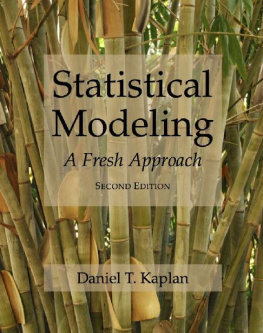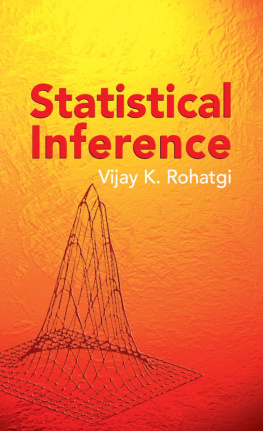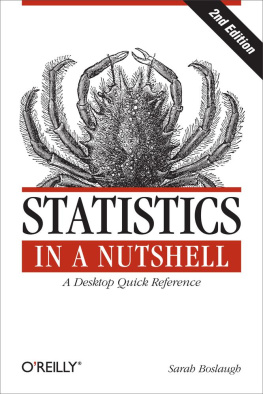Contents

This book cuts to the very heart of the core principles of statistical inference and does so in a way that is accessible and easily digestible. I honestly wish a book like this one had existed when I was a student I would have clutched it hard and never let it go!
Dr. Ruth Horry, Senior Lecturer in Psychology, Swansea University, UK
I see this book as a very useful resource, not only for those who have just started their journey at the university, but also for senior students to experience aha! moments while recapping the basics from a unique and nicely presented perspective. I am looking forward to recommending this book to my students as soon as it is available.
Dr. Krzysztof Cipora, Lecturer in Mathematical Cognition, Loughborough University, UK
As a new graduate student, I was suddenly faced with academic papers presenting statistical methods. But with hardly any statistical understanding myself, I struggled to do this well. I longed for a book that I could easily refer back to. This is that book. The explanations are very accessible, the examples are relatable, and the book is concise. I thoroughly recommend it.
Jennifer Read, Graduate Student in Education, University of Derby, UK
If you want to understand why we use statistics in psychology, this is the book for you!
Dawn Short, Ph.D. student in Psychology, Abertay University, UK
This is an accessible and helpful educational tool that students with a variety of backgrounds will enjoy. The author incorporates clear examples and is able to frame advanced concepts in a simple and straightforward way.
Dr. Dawn Weatherford, Associate Professor of Psychology, Texas A&M University, San Antonio, USA
Psychological Statistics
Psychological Statistics: The Basics walks the reader through the core logic of statistical inference and provides a solid grounding in the techniques necessary to understand modern statistical methods in the psychological and behavioral sciences.
This book is designed to be a readable account of the role of statistics in the psychological sciences. Rather than providing a comprehensive reference for statistical methods, Psychological Statistics: The Basics gives the reader an introduction to the core procedures of estimation and model comparison, both of which form the cornerstone of statistical inference in psychology and related fields. Instead of relying on statistical recipes, the book gives the reader the big picture and provides a seamless transition to more advanced methods, including Bayesian model comparison.
Psychological Statistics: The Basics not only serves as an excellent primer for beginners but it is also the perfect refresher for graduate students, early career psychologists, or anyone else interested in seeing the big picture of statistical inference. Concise and conversational, its highly readable tone will engage any reader who wants to learn the basics of psychological statistics.
Thomas J. (Tom) Faulkenberry, Ph.D., is Associate Professor and Head of the Department of Psychological Sciences at Tarleton State University in Stephenville, TX (USA). A mathematician by training, he teaches courses on statistics and mathematical modeling in the behavioral sciences, and his primary research areas are mathematical cognition and Bayesian statistics.
The Basics Series
The Basics is a highly successful series of accessible guidebooks which provide an overview of the fundamental principles of a subject area in a jargon-free and undaunting format.
Intended for students approaching a subject for the first time, the books both introduce the essentials of a subject and provide an ideal springboard for further study. With over 50 titles spanning subjects from artificial intelligence (AI) to women's studies, The Basics are an ideal starting point for students seeking to understand a subject area.
Each text comes with recommendations for further study and gradually introduces the complexities and nuances within a subject.
FRENCH REVOLUTION
Darius von Gttner
RESEARCH METHODS (third edition)
Nicholas Walliman
ARCHAEOLOGY (fourth edition)
Brian M. Fagan and Nadia Durrani
REAL ESTATE
Jan Wilcox and Jane Forsyth
MANAGEMENT (second edition)
Morgen Witzel
SEMIOTICS (fourth edition)
Daniel Chandler
For a full list of titles in this series, please visit www.routledge.com/The-Basics/book-series/B
Cover image: Getty Images
First published 2022
by Routledge
605 Third Avenue, New York, NY 10158
and by Routledge
4 Park Square, Milton Park, Abingdon, Oxon, OX14 4RN
Routledge is an imprint of the Taylor & Francis Group, an informa business
2022 Thomas J. Faulkenberry
The right of Thomas J. Faulkenberry to be identified as author of this work has been asserted in accordance with sections 77 and 78 of the Copyright, Designs and Patents Act 1988.
All rights reserved. No part of this book may be reprinted or reproduced or utilised in any form or by any electronic, mechanical, or other means, now known or hereafter invented, including photocopying and recording, or in any information storage or retrieval system, without permission in writing from the publishers.
Trademark notice: Product or corporate names may be trademarks or registered trademarks, and are used only for identification and explanation without intent to infringe.
Library of Congress Cataloging-in-Publication Data
A catalog record for this title has been requested
ISBN: 978-1-032-02096-9 (hbk)
ISBN: 978-1-032-02095-2 (pbk)
ISBN: 978-1-003-18182-8 (ebk)
DOI: 10.4324/9781003181828
Typeset in Garamond
by KnowledgeWorks Global Ltd.
Preface
My goal in writing this book is to give more people a chance to really understand statistics. Whether you are a first-year student or a recently-awarded Ph.D., I hope this book will help you to make better sense of how statistics works, especially in psychology and the behavioral sciences.
Given the size of this book, you might consider this goal as a fool's errand. Surely there is not enough material covered in this book to offer anyone a deep understanding of statistics. Right?
In some ways, you are absolutely correct. A quick glance at the numerous statistics textbooks on the shelf in my office tells me that a deep knowledge of statistics requires careful reading of many pages. One popular introductory textbook that I just randomly pulled off the shelf contains 18 chapters and 770 pages (with very small typeface). Moreover, there are many such books on my shelf. These books have it all (well, almost). As a reference book, these books are matched by few.
But few people can just read these books. In my experience, that's not how students learn statistics. Why not? Well, for one, the sheer size of these traditional textbooks can be intimidating. Students don't find them approachable. I know this because my students tell me this all the time. Also, these books tend to be very expensive. With the ever-increasing costs of attending universities in the United States (), expensive and encyclopedic are not necessarily the things I'm looking for when trying to find a textbook for my students.
Frustrated by this, I asked the following question one day on Twitter:
I wonder if there's a demand for a very short

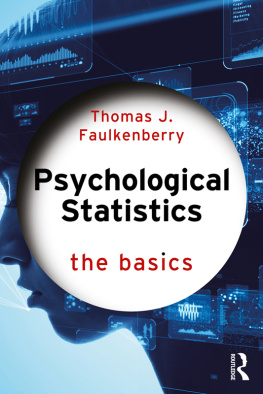
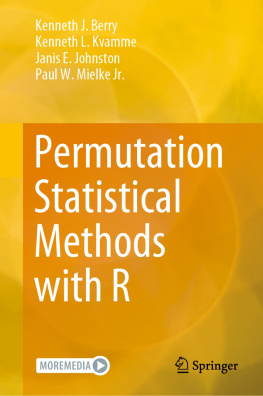

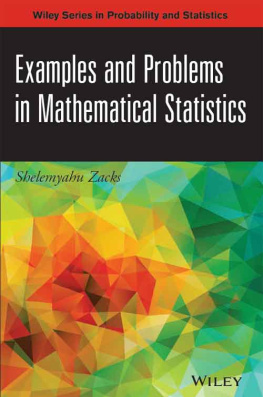
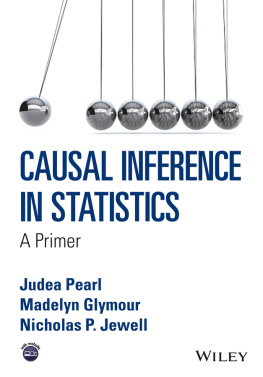
![James D. Miller [James D. Miller] - Statistics for Data Science](/uploads/posts/book/119637/thumbs/james-d-miller-james-d-miller-statistics-for.jpg)
